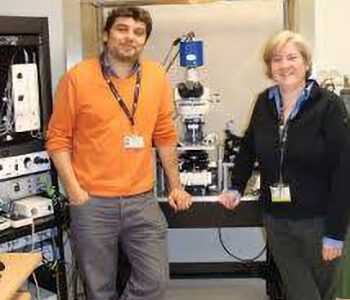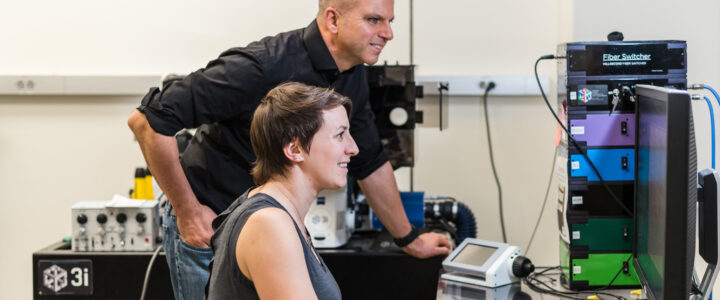With this $90,000 grant from 2017-2018, Dr. Banerjee’s team has shown that enhancing PKCε can correct brain development and abnormal behaviors in Fragile X knockout mice and had their findings published in PubMed.
Read moreAMPA
Cellular-Specific Therapeutic Targeting of Inhibitory Circuits in Fragile X Syndrome

Studies have shown that the function of inhibitory networks is disturbed in Fragile X. This abnormality is not well understood but appears to be secondary to abnormalities in metabotropic glutamate and endocannabinoid systems. With a $90,000 grant from FRAXA, Dr. Molly Huntsman’s team examined how these networks interact and how inhibitory deficits can best be remedied.
Read moreAuditory Dysfunction in Fragile X Syndrome in a Mouse Model of Fragile X

With a $90,000 grant from FRAXA, Dr. McCullagh and Dr. Achem Klug at the University of Colorado investigated whether auditory neural circuits are altered in Fragile X mice. They saw minor differences in these mice compared to B6 (control) mice in several measures of auditory acuity. Fmr1 mice had increased latency to the startle response for almost all conditions compared to B6 mice, suggesting altered timing to acoustic cues. These experiments show that, consistent with patient reports and anatomical/physiological data, the auditory system is altered in a mouse model of FXS, though with some potential compensation leading to a subtle behavioral impact.
Read moreCorrecting Sensory Processing in Fragile X Mice by Modulating Kv3.1

FRAXA awarded a $90,000 grant to Carlos Portera-Cailliau, PhD and Nazim Kourdougli, PhD at UCLA to investigate whether a novel drug can rescue sensory processing deficits in Fragile X mice. People with Fragile X have similar problems in sensory processing. This new drug acts on Kv3.1, a promising Fragile X treatment target also being pursued by UK-based Autifony Therapeutics based on FRAXA-funded research done at Yale.
Read moreDevelopmental Profile of Glutamatergic Synapses in Fragile X

FRAXA Research Foundation awarded a $90,000 research fellowship to Dr. Tue Banke. With this award, Dr. Banke investigate how glutamate receptors at neuronal synapses – essential building blocks of learning and memory – are impacted in Fragile X syndrome.
Read moreEnhancing NMDA Receptor Signaling to Treat Fragile X Syndrome

Dr. Stephanie Barnes investigated the role of NMDA receptors as a FRAXA Postdoctoral Fellow in Dr. Emily Osterweil’s laboratory at the University of Edinburgh from 2016-2018. With an additional year grant from FRAXA, she then continued her work to identify novel targets and test pharmacological therapies in the Fragile X mouse model at the Picower Institute at MIT with Dr. Mark Bear. Results published.
Read moreInvestigating Gene Reactivation to Treat Fragile X Syndrome

With a $180,000 grant from FRAXA Research Foundation from 2016-2017, Dr. Jeannie Lee and her team at Harvard are working to reactivate the gene that is silenced in Fragile X syndrome.
Read moreInhibitors of STEP as a Novel Treatment of Fragile X Syndrome

With a $349,000 grant from FRAXA Research Foundation from 2008-2015, Dr. Paul Lombroso and his team at Yale University researched if inhibiting STEP could reduce behavioral abnormalities in Fragile X syndrome. Results published.
Read moreSocial Behavior as an Outcome Measure for Fragile X Clinical Trials

One of the features of the Fragile X mouse model which is relevant to the human Fragile X syndrome (and autism) is social behavior. Several tests show consistent social behavioral abnormalities in the Fragile X mouse model. With a $140,000 grant from FRAXA Research Foundation in 2012-2013, Dr. Willemsen at Erasmus University used social behavior tests to measure the effectiveness of several drug strategies.
Read moreAMPAkines and BDNF in Fragile X: UCI Researchers Restore Memory Process in Fragile X

With a $104,498 grant from FRAXA Research Foundation from 2003-2008, Dr. Julie Lauterborn at the University of California has done several studies on dentritic spines and finding treatment targets for memory retention in Fragile X mice.
Read moreImproving Memory Reversal Testing and Treatment with AMPAkines in the Fragile X Knock-Out Mouse

A two year $62,000 FRAXA grant was been awarded to W. Ted Brown, MD, PhD from 1997-1998. The Principal Investigator at the Institute For Basic Research in New York aims to develop an improved test to show learning deficits in the FMR1 knock-out mouse model of Fragile X, and test experimental drugs (Ampakines) that may be effective in treating these deficits.
Read more
